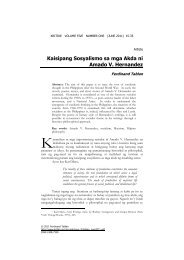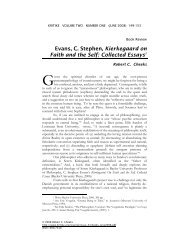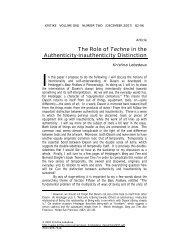The Paradox of Ipseity and Difference: Derrida's Deconstruction and ...
The Paradox of Ipseity and Difference: Derrida's Deconstruction and ...
The Paradox of Ipseity and Difference: Derrida's Deconstruction and ...
You also want an ePaper? Increase the reach of your titles
YUMPU automatically turns print PDFs into web optimized ePapers that Google loves.
34 THE PARADOX OF IPSEITY AND DIFFERENCE<br />
. . . writing is determined within a problematic <strong>of</strong> knowingremembering.<br />
It is thus from the start stripped <strong>of</strong> all its own<br />
attributes or path-breaking powers. Its path-breaking<br />
force is cut not by repetition but by the ills <strong>of</strong> repetition,<br />
by that which within repetition is doubled, redoubled,<br />
that which repeats repetition <strong>and</strong> ins so doing, cut <strong>of</strong>f<br />
from “good” repetition (which presents <strong>and</strong> gathers being<br />
within living memory), can always, left to itself, stop<br />
repeating itself. Writing would be pure repetition, dead<br />
repetition that might always be repeating nothing, or be<br />
unable spontaneously to repeat itself, which also means<br />
unable to repeat anything but itself: a hollow, cast-<strong>of</strong>f<br />
repetition. 9<br />
One will say then that Derrida, in this passage, is not actually against<br />
Plato but, rather, is in agreement with him. If “good repetition” were to be<br />
considered to be good, then one might as well adduce that such a repetition is<br />
able to bring back presence as it was. However, the case is that presence is always<br />
already lost within the experience <strong>of</strong> the consciousness: in place <strong>of</strong> this<br />
presence is a mediated ersatz <strong>of</strong> its original, a copy that is a dead repetition <strong>of</strong><br />
presence to which one might refer to as memory. In saying this, memory is<br />
already thought <strong>of</strong> in Derrida’s works as a representation <strong>of</strong> presence, it is the<br />
originary logos that imparts telos to the text.<br />
<strong>The</strong> repetition then <strong>of</strong> the logos is in part affected by memory. As an<br />
Other, for example, tries to read this text, that Other is in part recalling his or<br />
her own memory <strong>of</strong> what these symbols <strong>and</strong> signifiers signify, <strong>and</strong> in part, they<br />
are also looking at the syntax <strong>of</strong> my work as it plays along in its own symmetry<br />
so as to disclose my intentions to their own consciousness. As a consequence<br />
<strong>of</strong> this occurrence <strong>of</strong> the mediation <strong>of</strong> consciousness towards an Other, the<br />
alterity or différance 10 <strong>of</strong> each <strong>and</strong> every singularity that is the ego, affects the<br />
purity <strong>of</strong> repetition. In repeating these words in the consciousness <strong>of</strong> Others,<br />
the purity <strong>of</strong> my intentions begins to be blurred, if not totally erased. To recall<br />
Derrida’s notion <strong>of</strong> writing under erasure, 11 this situation shows that to write under<br />
erasure means that the present impetus <strong>of</strong> what appears <strong>and</strong> is present during the<br />
9 Jacques Derrida, Dissemination, trans. by B. Johnson (Chicago: University <strong>of</strong> Chicago<br />
Press, 1981), 135. [My emphasis]<br />
10 This is to retain the sense <strong>of</strong> difference <strong>and</strong> ipseity existing within the uniqueness or<br />
subjectivity <strong>of</strong> an individual’s own apperception <strong>of</strong> the Other <strong>and</strong> vice versa. To note, Levinas<br />
notion <strong>of</strong> alterity suggests an absolute aporetic fear <strong>of</strong> reduction, to which an affective<br />
manifestation <strong>of</strong> the face <strong>of</strong> the Other becomes an unfathomable imperative comm<strong>and</strong>. Derrida<br />
deconstructs Levinas’ position on ethics by pointing out Levinas’ aversion towards ontology as<br />
an internal limitation <strong>of</strong> the ethics <strong>of</strong> alterity by acknowledging the inevitable helplessness <strong>of</strong><br />
ethics in the absence <strong>of</strong> ontology. Despite this, one would later on find several distinct traces <strong>of</strong><br />
Levinasian ethics within Derrida’s latter works on ethics but only on the context <strong>of</strong> succumbing<br />
to alterity through the exhaustion <strong>of</strong> différance.<br />
11 Jacques Derrida, Of Grammatology, trans. by G. Spivak, (Baltimore: <strong>The</strong> John<br />
Hopkins University Press, 1997), 60.
















